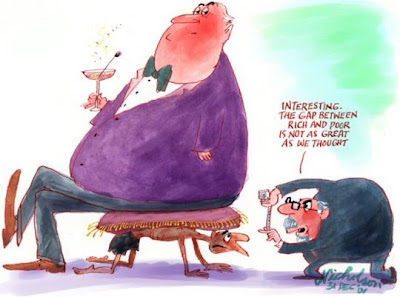
Take a good look at this cartoon (courtesy of the SF Sentinel online) and understand what it means. When the President of the United States, Barack Obama, signed into law the Health Bill today, he took America in the opposite direction we have been moving in (with respect to government policy and taxes) for the past 30 years.
Since the late 1970s, the top (read: wealthy) marginal individual income tax rates have declined. There has also been a simultaneous increase in payroll taxes that finance Social Security and Medicare. From this brief, publicly available information, we can assume that our federal tax system isn't particularly progressive; on the contrary, it appears to reward the wealthy and the expense of those in poverty.
Nearly every tenet of the Healthcare Law pushes in the opposite direction. It makes healthcare accessible to every citizen. If people have healthcare, overall they will be healthier to work and play and be productive members of our economy. This assumption is just the icing on the cake, however. The bottom line is that everyone needs healthcare. The Delasol Group believes that all costs aside, healthcare is a basic necessity that no one would want to be without in any capacity. We salute the Administration on their tireless efforts to work across partisan lines to provide for Americans' well-being.
In large measure, the Healthcare initiatives will be financed by taxes on the wealthy. Households that earn more than $250,000 a year will see payroll taxes increase. Most of the beneficiaries of the new law are making less than four times the poverty level, or about $88,000. (The poverty level is set at $22,056 a year for a family of four, according to the Department of Health and Human Services' poverty guidelines (2009 guidelines are in effect until March 31, 2010) - which differs from the Census Bureau's official poverty threshold. If you are in this group and don't have insurance, subsidies will be made available to cover the costs.
Here's a list of other major changes we can expect now and in the new few years with the landmark passage of the $940 billion Health Bill:
- The good news (and contrary to some) is that Medicare and the Children's Health Insurance Program (CHIP) will not cut back on eligibility. They can only expand it.
- We like this one!! Within 60 days, the Secretary of the U.S. Department of Health & Human Services (HHS), Kathleen Sebelius, must develop a standardized format to be used to present insurance information to the people of the United States in an "understandable way."
- By 2014, state-run insurance exchanges will will up and running. Persons choosing not to sign up with their employeer-provided insurance can opt to choose a carrier from a state-run exchange. More options mean that we can hold the insurance carriers accountable for better service for everyone.
- Monetary penalties on citizens who choose not to carry individually mandated insurance will begin in 2014.
- Plans will no longer be able to charge for pre-existing conditions.
More provisions for the final Healthcare Bill can be found in this interactive feature from the New York Times. We encourage you to continue to learn more about how this historic legislation affects you and your family.

In all economies worldwide, the demand for healthcare exceeds the available supply, mostly due to rising costs for medical equipment and services, but also because of accessibility. The people in Haiti have faced both of these issues head-on since the earthquake in January. The problem is obviously acute in low-income communities, at home and abroad. We have an obligation to provide for what's best for the public's welfare and healthcare is what's best for everyone.
No comments:
Post a Comment